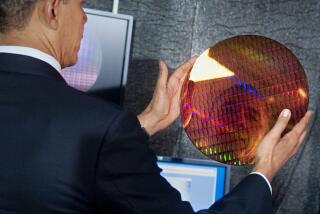Tiny town’s new owner clings to the old ways : Pieces of a world gone by live on in Millican, Ore. A retiree says his purchase won’t change a thing.
- Share via
MILLICAN, Ore. — The population here in high-desert Millican has doubled during the last half-century, from one to two. That’s people.
But the city park has stayed the same--a 20-by-30-foot patch with a lone juniper throwing shade over a single picnic table.
The gas pumps haven’t been updated in decades. Inside the Millican Store, you can sip a cup of coffee made from water from an old well or grab a cold drink out of a wood-and-glass walk-in cooler, plop down at the card table and contemplate how the place is to resist the blistering and bewildering pace of change in the world.
Which is just as Millican’s new owner insists it be.
“This type of place is an endangered species, probably more than any spotted owl,” says Erle Cooper, a retired Alaska businessman and the latest of half a dozen or so men to hold deed to this bit of gas-stop Western history that needs no brass marker on the wall to pronounce its authenticity.
“There’s just something about the place. Call it character,” Cooper said. He shows a stranger around the sagging, creaking buildings that have been nailed and mortared together over the passing seasons to make up this artifact of a so-called town, half an hour east of Bend, just about smack in the center of Oregon.
Yes, there are other dried-up stagecoach towns in the rural West. There are even a couple for sale farther down the road from Millican. But how many of them have a vest-pocket city park? How many of them are 110 years old? How many of them refused the demands of the brand-name oil franchisers to build big awnings over the pumps? How many have murder in their past?
Cooper and his wife, Virginia, bought the place last February. The last longtime owner, Bill Mellin, was found slain on the property two years ago. A drifter who was working at the store was convicted of the killing. For a long time, Mellin’s heirs couldn’t sell the place. One look at the books and you could tell nobody could make a living and pay off a loan on the property from the small trickle of motorists passing on the two-lane highway or the hang-gliding enthusiasts who come to the Millican Valley to ride its famous thermals.
You needed someone like Cooper, with the money from a trucking and boating business in Homer, Alaska, to buy Millican. And you needed someone with a will to fix it up, but not so you could notice.
“I knew what I didn’t want. I didn’t want a . . . well, I didn’t want a 7-Eleven,” Cooper said.
The post office and telephone company do not recognize Millican as an official town. But the state of Oregon does, and it appears on maps and highway signs.
When they first moved from Alaska to Oregon, the Coopers bought a house in a larger community over the hill from Millican, so they don’t qualify as its residents. That honor goes to Russ and Margie Haley, who heard the Coopers were looking for someone to live at the store and run the business. They were happy to flee the urban pressures of Bend, population 18,000.
Together, the Haleys represent a 100% jump in population since 1930, when a previous owner, Bill Rabin, posed for a photograph with a sign that said: “Millican, elevation 4252, pop. 1.”
So with all this new blood and vitality, Millican seems ready to prosper still more while spitting in the face of modern change. Cowboys still buy their prepared sandwiches out of the cooler, walk into the room in the store, sit on a couch and call it dinner. A cross-country bicyclist naps on a chaise lounge in the park and calls it relief from peddling through the dry winds blowing soundlessly across 30 miles of sagebrush and scrub trees. A sign welcomes you to use the restrooms whether you buy anything or not.
A guest book shows that passers-by from as far away as Paris and Tokyo were curious enough to stop.
“This is a place they can get the feeling of an America outside the big cities. And what can you tell about a place from its big cities, anyway?” Cooper said.
“This is the West without a lot of changes. This is where they can see the end of an era.”
More to Read
Inside the business of entertainment
The Wide Shot brings you news, analysis and insights on everything from streaming wars to production — and what it all means for the future.
You may occasionally receive promotional content from the Los Angeles Times.








